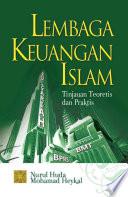Buku ini secara khusus membahas Bank dan Lembaga Keuangan Syariah, terutama yang berkembang di Indonesia. Di dalam buku ini disajikan konsep dan praktik Bank Syariah, Pasar Uang Syariah, Pasar Modal Syariah, Reksadana Syariah, Pasar Uang Syariah, Asuransi Syariah, Dana Pensiun Syariah, Perusahaan Modal Ventura Syariah, Lembaga Pembiayaan Syariah yang terdiri dari Perusahaan Sewa Guna Usaha, Perusahaan Anjak Piutang, Perusahaan Kartu Plastik, dan Perusahaan Pembiayaan Konsumen. Ada pula Lembaga Keuangan Mikro Syariah yang terdiri dari Pegadaian Syariah, Lembaga Pengelola Zakat, Lembaga Pengelola Wakaf, dan Koperasi Syariah atau BMT. Dalam buku edisi kedua ini berbagai hal telah dimutakhirkan sesuai dengan perkembangan yang telah terjadi. Buku Persembahan Penerbit PrenadaMedia -Kencana-
Daerah kabupaten atau daerah kota dibentuk oleh bupati atau wali kota atas
usul kepala kantor departemen agama kabupaten atau kota; dan d. Kecamatan
dibentuk oleh camat atas usul kepala kantor urusan agama kecamatan. b.
Pengurus dan Unsur Organisasi BAZ Pengurus BAZ terdiri atas unsur
masyarakat dan pemerintah yang memenuhi persyaratan tertentu. Unsur dari
masyarakat ini lebih lanjut dijelaskan dalam Keputusan Menteri Agama Nomor
581 Tahun 1999 tentang ...










